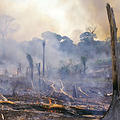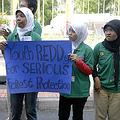 為了發展中國家賴以為生的森林,世界銀行11日於巴里島進行中的聯合國氣候變遷會議上,發起一項對發展中國家的資助計畫,金額達數百萬美元。
為了發展中國家賴以為生的森林,世界銀行11日於巴里島進行中的聯合國氣候變遷會議上,發起一項對發展中國家的資助計畫,金額達數百萬美元。
世界銀行總裁佐利克(Robert Zoellick),在介紹「森林碳夥伴基金」(The Forest Carbon Partnership Facility)此一機制時表示,森林的存留,比砍伐森林重要的多,此為森林碳夥伴基金成立之因。樹木的天然功能,就在於它能夠吸收主要的溫室氣體:二氧化碳。
森林消退與森林劣化,是造成全球暖化的次要因素,僅次於石化燃油的使用。
此次的氣候變遷會議,重點在於降低每年因森林消退而產生的16億噸二氧化碳;佔全球二氧化碳排放量的20%,也超出全球能源密集運輸地區的總和。 
森林消退與森林劣化,同時也造成部分國家溫室氣體的高排放量。巴西因此而產生的溫室氣體,佔其國內總排放量的70%,印尼則是80%。
森林碳夥伴基金此一新設置的機制,將協助熱帶與次熱帶的發展中國家,使其有能力降低來自於森林消退與森林劣化的溫室氣體;並且在不久的將來,發起一個對減少溫室氣體排放,有正面鼓勵意義的系統。
A new multi-million dollar fund to compensate developing countries for the value of their living forests was launched today by the World Bank at the United Nations climate conference in Bali.
The Forest Carbon Partnership Facility was developed because forests are more important left standing than cut down, said World Bank Group President Robert Zoellick, introducing the new facility. As a natural function, trees absorb carbon dioxide, the main greenhouse gas.
Deforestation and forest degradation together are the second leading cause of global warming, second only to the combustion of fossil fuels.
High on the agenda at the Bali talks is reducing the 1.6 billion tons of carbon emissions caused each year by deforestation, which amounts to about 20 percent of global carbon emissions and more than the combined total of the world's energy-intensive transport sectors.
Deforestation and forest degradation are responsible for a high percentage of some countries' national emissions - 70 percent of Brazil's and 80 percent of Indonesia's, for instance.
The new facility will build the capacity of developing countries in tropical and subtropical regions to reduce emissions from deforestation and degradation and tap into a future system of positive incentives to reduce emissions.
全文及圖片詳見:ENS





